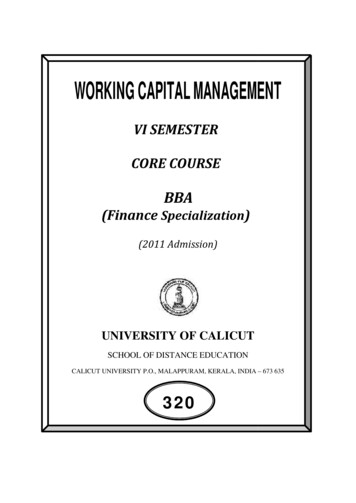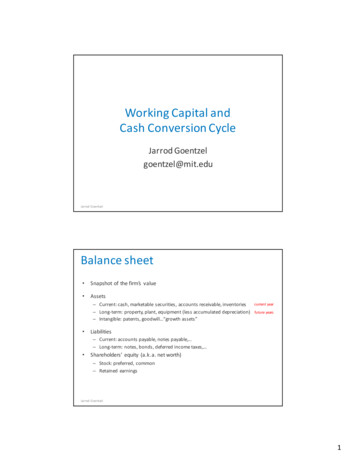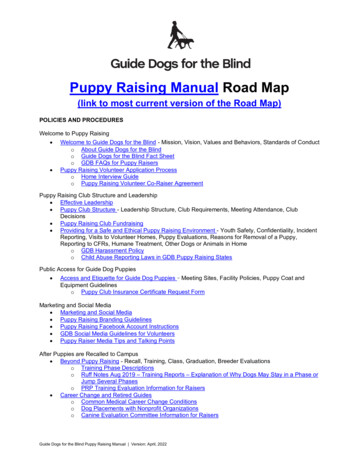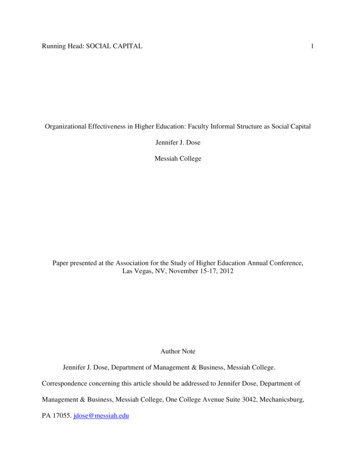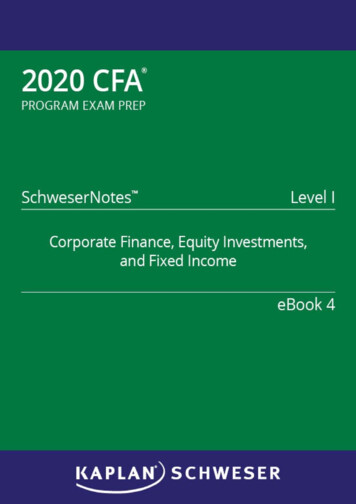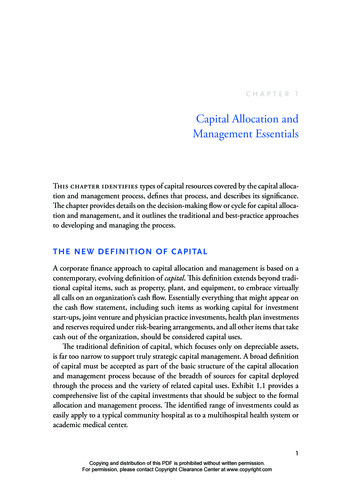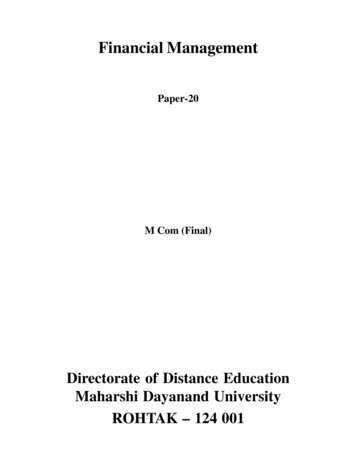
Transcription
A GUIDE TO RAISINGCAPITAL FOR REAL ESTATETRANSACTIONS
A GUIDE TO RAISING CAPITAL FOR REAL ESTATE TRANSACTIONSThe pool of individuals and businesses that own or are interested in acquiring real estate investments has never beendeeper. With a plethora of asset types ranging from single-family homes to downtown skyscrapers – with multi-familyapartments, senior-living communities, commercial medical facilities, retail centers, manufacturing buildings andindustrial warehouses (to name a few) sandwiched in-between – opportunity abounds for those willing to take theplunge. And while the terms and availability of debt financing for real estate acquisition and development have seldombeen better in recent memory, access to this vast cache of opportunity rests, in large part, on the ability of the buyerto bring capital to the closing table.Given the capital-intensive nature of real estate investing, there are few in the marketplace with both easy access topotential real estate assets and the cash (or desire) to independently acquire, construct, develop, own and/or operate thoseassets. As a result, it is often necessary for those with access to attractive real estate investments to raise all or a portion ofthe required capital for those investments from third parties ranging from friends and family to institutional investors.Whether you are a seasoned real estate professional or considering yourfirst real estate investment, raising capital for a real estate investmentcan bring with it significant economic and other potential benefits.It can also be daunting and rife with concepts with which you areunfamiliar or uncomfortable.The goal of this series will be to de-mystify the concepts involved in raising equity ormezzanine capital for real estate transactions to make them more understandable andapproachable for individuals and businesses interested in participating in the real estateinvestment space. This initial guide provides a high-level summary of certain topicscentral to sourcing, structuring and accepting investments in real estate projects.1
REAL ESTATE INVESTMENT STRUCTURESSIMPLICITY IS STANDARDReal estate investments take a multitude of structural forms driven by the desire of the “sponsor” of the investment(typically, the individual or business bringing the investment opportunity to market) and its prospective investors tocapture a wide variety of benefits available to real estate owners and investors or to avoid any number potential drawbacks.“Partnership,” “fund,” “joint venture” and “1031” are widely used termsthat, directly or indirectly, reference just a handful of available investmentstructures. Add in the alphabet soup of “JVs,” “LPs,” “REITs,” “OZs,” “DSTs”and “TICs” and it is no wonder that many can be confused or intimidatedwhen attempting to structure a real estate investment.Despite the seemingly endless structuring options, many (if not most) real estate investments takea relatively simple form – referred to colloquially as a “GP/LP” structure – whereby the investmentsponsor (GP) actively manages and controls the investment and investors (LPs) take a passiverole in reliance upon the experience and knowledge of the investment sponsor. Many investmentstructures, including joint ventures, single- and multiple-asset investment funds, and certainof the tax-based structures referenced later, are simply variations on or otherwise incorporatethis “GP/LP” structure.Ultimately, while structuring a real estate investment may appear at the outset to be anoverwhelmingly complicated undertaking, that is simply not the case in the majorityof instances.2
MORE ON STRUCTURINGEXPLORING COMPLEXITYWhere additional structural complexity is necessary, the benefits of the complexity tend to outweigh the burdens. Forexample, structures may be employed to leverage available tax credit programs or tax increment financing; allow for1031 “like-kind” exchanges; qualify for “Opportunity Zone” benefits; take advantage of benefits available to real estateinvestment trusts (REITs); or a combination of these options. In each case, necessary structural complexity may resultin a significant boon to investment returns and provide access to different or additional investment partners withmore targeted or nuanced investment strategies.In the end, the large number of structuring options should be viewed not as a barrier to entryinto the real estate investment space but as a tool that, if understood and employed effectively,can help drive significant economic benefits to investment sponsors and their investors.An experienced and knowledgeable legal and advisory team can be invaluable as youconsider structuring options for your proposed real estate investment.
SETTING INVESTMENT TERMSWHAT IS MARKET?Regardless of structure, an investment sponsor will only be successful in raising capital if itsinvestment offering is attractive and marketable to prospective investors. The marketabilityof a real estate investment offering will depend on two things: The inherent characteristics of the particular investment (type of asset, past and projectedfinancial performance of the particular investment, etc.) The terms of the investment offered to investors.Investment sponsors have virtually unlimited flexibility in determining what to offertheir prospective investors, and the sheer number of options can make it difficult to knowwhere to start. Ultimately, however, investment terms can be simplified into twoprimary buckets – management rights and economic rights – and what is acceptableto sponsors and investors within these “buckets” is typically driven, in large part, by themarket for investments similar to the one proposed.4
MANAGEMENT RIGHTS VS. ECONOMIC RIGHTSMANAGEMENT RIGHTSSGenerally speaking, these relate to the relativerights of the investment sponsor and its investorsto manage, govern and make decisions regardingthe underlying real estate investment. Perhapsunsurprisingly, investors may be willing to givemore management leeway to investment sponsorswith a long track record of successful real estateinvestments than to new entrants into the realestate investment space. New sponsors mayfind it necessary, for example, to offer investorssignificant rights with respect to material decisionsrelated to the underlying project, such as assetsales or refinancing of debt secured by the project,or rights that more easily allow for changes inmanagerial control if the sponsor is unable tosatisfactorily perform.ECONOMIC RIGHTSSThese are provisions that dictate an investor’sreturn on its investment and govern the relativerights of the investment sponsor and its investorsto payments or distributions from the operation,refinancing or sale of the underlying investment.These rights encompass concepts such asdistribution waterfalls, preferred returns andcarried or “promoted” interests. They will alsodetermine any fees, such as asset managementfees, development fees or acquisition/dispositionfees, payable to the sponsor or its affiliates inconnection with the investment. More thanmost other considerations, understanding“market” economics is an important prerequisiteto successfully raising capital for a real estateinvestment. It goes without saying that investorswill not be interested in a deal that is not market.5
THE LEGAL LANDSCAPEINVESTMENT OFFERINGS ARE SECURITIES OFFERINGSIn exchange for their investments, equity investors will typically receive an interest (typically LLC units, partnershipinterests, or stock) in the entity that will, directly or indirectly, acquire, develop, own and/or operate the underlying realestate asset (whereas debt investors may receive a promissory note or similar instrument). These investment interests(whether equity or debt) are “securities,” and the offer and sale of securities is highly regulated under a complexmixture of federal and state statutes.All offers and sales of securities must be either registered with the Securities and Exchange Commission (SEC) andapplicable state regulators or must otherwise be exempt from registration. Due to the time and cost required to registera securities offering with the SEC and/or state regulators, very few investment sponsors register their investment offerings.Instead, the vast majority of real estate investment offerings are conducted under available registration exemptions(terms like “Reg. D” and “crowdfunding” are commonly used as shorthand references to certain of these exemptions).6
While the SEC has made recent attempts to significantly expand the availability and utility of its registration exemptionsin hopes of fostering private access to investment capital, the existing statutory scheme remains complex and potentiallyconfusing to those without significant experience.For example, securities laws impose significant limitationsand/or obligations with respect to: Information that must be disclosed to prospectiveinvestors (including, in certain cases, auditedfinancial information) The dollar amount of capital that may be raised(including limits on individual investments bynon- ”accredited” investors in certain situations); The number and/or type of investor that maybe solicited for investment (including restrictionson the inclusion of certain investors who arenot “accredited” and do not meet certain income,net worth and/or sophistication thresholds); The manner in which investment sponsorscommunicate with prospective investors(including limitations on public advertisingor solicitation of investments).These are only a handful of the important facts and circumstances that must be consideredin connection with a proposed investment offering under the current regulatory regime.As the country moves forward under a new administration, it is important to note that,due to appointment of new SEC commissioners, changes in regulatory priorities or otherconsiderations, rules can (and frequently do) change and recent efforts to reduce regulatoryburdens on raising capital can be undone. In all cases, we urge you to engage an experiencedsecurities attorney with a detailed understanding of the applicable federal and stateregistration exemptions to ensure your offering is legally compliant.7
MORE ON SECURITIES LAWSINVESTMENT ADVISER AND INVESTMENT COMPANY CONSIDERATIONSAn additional layer of securities regulation that is often underappreciated (or perhaps misunderstood) by real estateinvestment sponsors relates to the potential characterization of the adviser as an “investment adviser” or the investmententity as an “investment company.” If an investment provides for fee ownership of the underlying real estate (eitherdirectly or indirectly through one or more wholly owned or controlled entities), neither the investment sponsor nor theunderlying investment will generally be subject to regulation as an investment adviser or an investment company.Variations on this typical investment structure, however, including joint ventures or other co-ownership arrangements,may in certain instances result in minority or passive ownership of an underlying real estate investment. In theseinstances, investment adviser and investment company issues may come into play and bring with them onerousregistration and compliance requirements.Understanding the regulatory framework governingsecurities offerings is imperative for anyone intendingto sponsor one or more real estate investments, as failureto comply with applicable rules and regulations canseriously undermine the viability of the investment(s) andcan lead to personal liability for the investment sponsor.8
LIABILITY CONCERNSWHY SHOULD I CARE?The primary legal remedy available to investors with respect to a real estate investmentis a claim for rescission of their investments, which, if successful requires the sponsor toreturn the investors’ investments, plus attorneys’ fees, costs and interest. In addition toinvestors’ rescission claims, securities regulators may also institute monetary penaltiesor institute orders suspending or barring the investment sponsor from participating inexisting or future investment offerings.In addition, real estate investment sponsors are often susceptible to non-securities claimsrelated to conflicts of interest. These claims typically arise either from the use of affiliatedservice providers (such as developers, general contractors, property managers, etc.) or, inthe case of a sponsor with multiple concurrent investments, the allocation by the sponsorof a particular real estate investment to a particular investment vehicle. Failure to discloseconflicts of interest, or to provide for a mechanism for resolution of such conflicts, is acommon source of legal problems for real estate investment sponsors.Legal issues of this nature tend to arise at a time when investment expectations arenot being met, due to poor performance of the underlying investment, failure of theinvestment sponsor to deliver projected returns, or otherwise. As a result, these claimscan exacerbate existing issues or undermine completely the viability of a real estateinvestment, which can create additional legal issues for the investment sponsor, includingdefaults under existing debt financing, guaranties or agreements with third-party serviceproviders. Depending on the facts and circumstances, the investment sponsor could bepersonally liable in connection with certain legal clams.By understanding and ensuring compliance with securities laws and other applicableregulations from the outset, an investment sponsor can eliminate or significantly mitigatepotential legal liability in connection with raising capital for real estate investments.9
ADDITIONAL CONSIDERATIONSWhile the foregoing summary touches on a number of the primaryconsiderations and concerns related to raising capital for real estatetransactions – it is certainly not all-encompassing. If you havequestions regarding anything discussed in this article or any futurearticle in this series, or if there are issues or concepts not outlinedabove about which you would like additional information (or youbelieve deserves a dedicated article), please reach out to Evan Sheetsor another member of the Winthrop & Weinstine real estatefinance and development team.ABOUT WINTHROP & WEINSTINEHeadquartered in Minneapolis, Winthrop & Weinstine is a leading real estate law firm with clients in Minnesota,the Midwest and beyond. Financial institutions, developers and investors seek our attorneys’ expertise withissues related to financing real estate projects, large and small.Getting projects built takes dedication, time – and money. Our attorneys work with clients to source and combine financingfor real estate projects and help them navigate the sometimes rocky path of real estate finance. We see roadblocks anddetours as opportunities in disguise, and develop creative, practical alternatives to obstacles that arise.For more information about Winthrop & Weinstine visit www.winthrop.comThis publication should not be construed as legal advice or legal opinion on any specific facts or circumstances.The contents are intended for general information purposes only, and you are urged to consult your legal counselconcerning your situation and any specific legal questions you may have. This may be considered Advertising Material.
Given the capital-intensive nature of real estate investing, there are few in the marketplace with both easy access to potential real estate assets and the cash (or desire) to independently acquire, construct, develop, own and/or operate those . structuring and accepting investments in real estate projec
